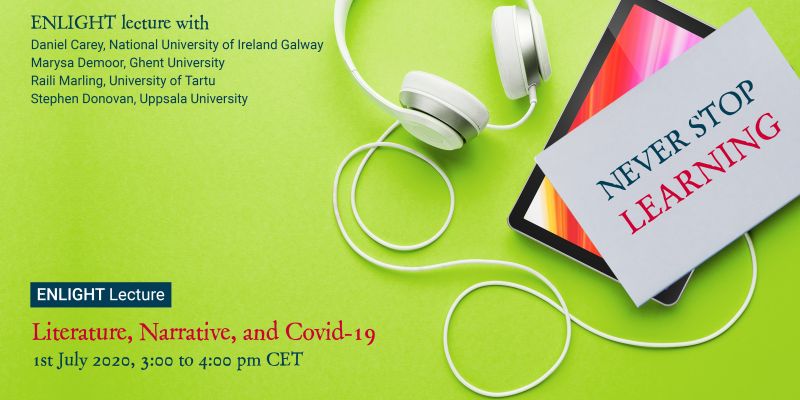NEWS & EVENTS

ENLIGHT Lecture 'Literature, Narrative, and Covid-19' (1 July 2020)
On Wednesday 1st July 2020 from 3:00 to 4:00 pm (CET) we have organized the public ENLIGHT lecture 'Literature, Narrative, and Covid-19'. The full video is published on https://www.youtube.com/watch?v=H36iWPFgqVs
Storytelling has formed an intrinsic part of the Covid-19 pandemic through journalism and other media, including social media exchanges. This session looked at forms of literary and narrative engagement with plague, disease and crisis from the 19th century to the present day. For this, Daniel Carey (National University of Ireland, Galway) was joined by Marysa Demoor, Ghent University (Belgium), Raili Marling (University of Tartu, Estonia) and Stephen Donovan (Uppsala University, Sweden) to discuss in Daniel Defoe’s Journal of the Plague Year and The Storm, as well as the coverage of epidemics in 19th-century periodicals, and the representation of epidemics as looming but invisible crises in fiction.
Daniel Carey is Director of the Moore Institute for research in the humanities and social studies at the National University of Ireland Galway, and a professor of English. He is a Vice-President of the Royal Irish Academy and serves on the Irish Research Council. His research focuses on early modern travel, intellectual history, and history of science. More information on https://mooreinstitute.ie/author/daniel-carey/
Teaser: His contribution focuses on Daniel Defoe’s Journal of the Plague Year (1720), a retelling of events of the Great Plague of London (1665-66). This remarkable novel would have provided the best guide to public health officials during the Covid-19 pandemic in their efforts to anticipate the impact of the disease and the challenge of managing it.
Marysa Demoor is senior full Professor at Ghent University. Demoor is the author of Their Fair Share: Women, Power and Criticism in the Athenaeum, 1870–1920 (2000) and the editor of Marketing the Author: Authorial Personae, Narrative Selves and Self-Fashioning, 1880–1930 (2004). With Laurel Brake, she edited The Lure of Illustration in the Nineteenth Century (2009) and the Dictionary of 19C Journalism (2009). With Ingo Berensmeyer and Gert Buelens she has co-edited the Cambridge Handbook to Literary Authorship (2019). Her recent research, provisionally entitled A Very Special Relationship: The Cross-Cultural History of Britain and Belgium in the Long 19C, is under review for publication. She is currently engaged on a companion to WWI periodicals (EUP). More information on https://research.flw.ugent.be/en/marysa.demoor
Teaser: This contribution will describe the beginnings of a new project exploring the ways in which 19C periodicals covered information about epidemics. I will look at a few examples to illustrate the hypothesis that 19C media share important similarities with 21C ones.
Stephen Donovan teaches at the Department of English, Uppsala University, Sweden. He has published on Joseph Conrad, empire writing, and periodicals history, and is currently working with Matthew Rubery on a study of Victorian investigative journalism and the novel. More information on https://katalog.uu.se/profile/?id=N6-250
Teaser: Daniel Defoe wrote The Storm in the aftermath of a gigantic hurricane which battered Great Britain on 26-27 November 1703. Combining journalistic reportage with eyewitness testimony, it sought to offer a new, collective perspective on a shared national trauma. Three hundred years later, as Britain finds itself struggling with the human and economic consequences of a very different kind of emergency, Defoe’s pioneering account invites us to think again about the relationship between natural disaster and our shared sense of national identity.
Raili Marling is Professor of English Studies at the University of Tartu, Estonia. Her research interests include gender in modernist and contemporary literature, neoliberal biopolitics, critical affect studies and the possibilities of combining affect and discourse studies. More information on https://www.etis.ee/CV/Raili_Marling/eng
Teaser: Her contribution stems from the research project she currently leads on imagining looming but invisible crises (from climate change to the current pandemic). She will speak about the contradictory affects created by this “crisis ordinariness” and the possibilities of fiction in representing them.